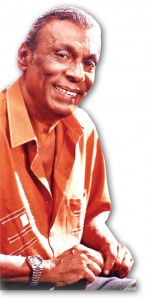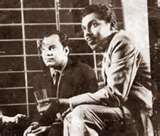Good bye Joe: A great actor and a greater humanist, we’ll miss you
In the final interview that Gamini Fonsekagave the press before he passed away on September 30, 2004 he was asked one last question:
“Including yourself, who do you think is the best actor that Sri Lanka produced?” Gamini did not hesitate even a second. He came out with the answer: “Joe Abeywickrama”. Gamini Fonseka was never generous with praise for others, yet to receive such an accolade from him must mean a lot, not only to Joe Abewickrama but to anyone else too.
Joe’s versatility as an actor is beyond dispute. His entry to cinema acting, as in most cases, was in minor rudimentary roles, first as a comedian, then gradually assuming greater proportions with each new movie; Joe and the Sinhala cinema peaked at the same time with the screening of Tunman Handiya, the poetic flow of rustic ripeness of village life on celluloid. His memorable role-playing as Abilin in Tunman Handiya enriched the movie further and Mahagama Sekara, its creator who was primarily a poet without any equal at the time, paid glowing tribute to Joe on his masterful performance in the film.
Joe’s performance in Saravita as “Saraiya”, a betel seller, was acclaimed by Jayawilal Wilegoda, the well-known cinema critic, as the best ever piece of acting in the Sinhala cinema up to that time. But his climb to mastery in acting assumed another scale with the screening of D B Nihalsinghe’s Velikathara. Acting as “Goring Mudalali”, in a villainous role, Joe exhibited his mastery of acting, equaling or even surpassing the movie icon Gamini Fonseka in the same movie. It is very seldom that a cinema actor who enters the field as a comedian, ends up as a superstar in varied role-playing. Joe’s heart-wrenching performances as “Vannihamy” in Pura Handa Kaluwara and “Silindu” in Baddegama won him many an award both locally and in the international arena. The most salient feature of Joe Abeywickrama’s acting was his dialogue delivery, reminding one of Dilip Kumar in “Devdas”, “Ganga Jamuna” and “Ram Aur Sham”, Jack Nicholson in “One Flew Over the Cuckoo’s Nest”, Marlon Brando in “Godfather” and “On the Waterfront” and Robert de Nero in “Raging Bull” and “Once Upon a Time In America”. This was where even Gamini Fonseka was second to Joe- in dialogue delivery. It is in the same field-dialogue delivery that Punya Heendeniya and Swarna Mallawarachchi outclassed Malini Fonseka. As far as Joe Abeywickrama was concerned, he had no equal in the art of dialogue delivery.
I knew Joe quite intimately. We used to meet quite frequently in the nineteen eighties for a drink, ending up with dinner at some Colombo restaurant. Once he introduced me to Lionel Wendt Art Circle and made me a member and on the way back he showed his talent, not in
acting, but in singing. While I was at the wheel, Joe started singing Mohamed Rafi’s heartrending song, “Suhani Rathi Dal Chukee” of “Dulari” fame and without missing a single beat. I asked him as to why he did not take to singing and he replied that he liked singing, but not as a professional singer. His talents were multifaceted but he was reluctant to show the world that he was such.
The last time I met him was about one and half years ago, in Colombo. I called him and made a dinner appointment. When I reached his abode in Pagoda, his man-servant accompanied him to my car and seated him in the front seat. I asked him whether he could recognize me and his reply was “Vishnu, I see a shadow but I recognize your voice and tone”. I took him to a Colombo club where we had a few drinks and dinner. It occurred to me that it might be the last time that I was taking him out. On the way back, he asked me to keep in touch with him, which I promised to do. A humble and shy man, Joe never wanted to show off his personality. Though his stature was made of steel fiber, his veins carried very red and human blood. His sense of humanity was pervasive wherever he went and whichever stratum of people he met. In real life he was the living personality of Abilin in Tunman Handiya or Saraiya in “Saravita”, but never the Goring Mudalali in Velikathara. He was the very personification of village innocence and undiluted honesty.
Joe, you brought laughter and tears to the silver screen; you brought innocence and honesty to the Sinhala cinema, you brought talent and hard work to the local films and above all, you brought hope and optimism to the cinema craft. The Sinhala cinema is richer today, because a giant like you trod upon it.
May you attain Nibbana.



September 26, 2011 at 10:27 am
Well written article!If my guess is right, the author of this article is privy to many interesting stories,and he is himself is a talented singer,favourite song”Master Sir”.Knew Joe very well.
September 25, 2011 at 10:40 pm
Very good article everyone will feel about him when you go for a Sinhala film in future.
September 25, 2011 at 10:36 pm
He was great Cinema Actor no one can beat him in acting and very innocent life he was spending I remember in 60’s he was a joker that time everyone thought for his name become joker but hat offs to Dr. D.B. Nihalasingha who made him a different character and become real actor for Sinhala cinema. I remember somewhere 60s when he was in film shooting at BADUTH E EKKA HORU met personally and he was very friendly with the People and he too was interested in environmentally. Joe was great son to the country as well to the Sinhala cinema and hopes present youngsters who are in the field will learn and carries some valve able theories about him to the Sinhala cinema.
September 25, 2011 at 10:38 am
A fine tribute to a wonderful human being,Thank u Vishnugupta